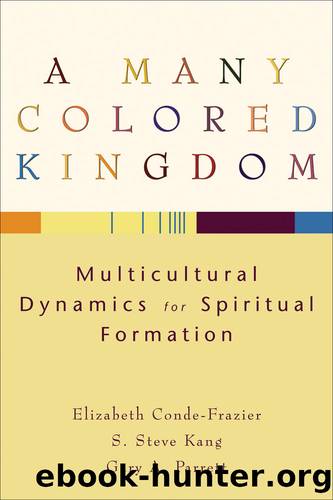A Many Colored Kingdom by Elizabeth Conde-Frazier

Author:Elizabeth Conde-Frazier [Elizabeth Conde-Frazier, S. Steve Kang and Gary A. Parrett]
Language: eng
Format: epub
ISBN: 9780801027437
Publisher: Baker Publishing Group
Putting on New Garments
As we have seen, none of us can be truly incarnate in another culture as Christ was for our sakes. Nevertheless, we can and should seek to identify with any culture in which we are called to serve, following the examples of both Jesus and the apostle Paul. Paul was determined to âbecome all things to all peopleâ for the sake of the gospel. For the sake of âbringing many sons to gloryâ (Heb. 2:10), the eternal Son of God âshared in their humanityâ (Heb. 2:14), was âmade like his brothers in every wayâ (Heb. 2:17), and was âtempted in every way, just as we areâyet was without sinâ (Heb. 4:15). In Philippians 2, Paul writes that Jesus took on âthe very nature of a servantâ and was âmade in human likeness.â To wash the disciplesâ feet, Jesus, having taken off his outer garments, put on a new garmentâa towel, wrapping it around his waist in readiness to serve (John 13).
When we are called to minister in a cultural context other than our own, we must seek to identify with that culture for the sake of the gospel. Such action is motivated by servant love and, as is the case whenever we strive to be servants of others, requires deep humility. But as we do so, we must wrestle with the issue of how much of that culture we can take upon ourselves while retaining our integrity. Put otherwise, what ought to happen when the gospel is introduced into a particular culture and the call to discipleship is sounded in that context? This sort of âChrist and cultureâ question has challenged and perplexed Christians throughout the ages. Space does not allow us to probe this fully here but only to offer a few suggestions.
To begin with, when the gospel truly penetrates a culture, it becomes enculturated in that setting. It cannot remain detached from or unaffected by the culture. As Newbigin says, âThere can never be a culture-free gospel.â[22] In gospel ministry today, the role that culture plays is complex on all sides. The gospel is carried into a given culture by messengers who have a culture of their own. The messengersâ understanding of the gospel has been deeply influenced by that culture. The new recipients of the gospel, even in their initial hearing of the gospel and certainly in any subsequent adoption of it, are deeply influenced by their distinct culture. We may be disturbed by such thoughts, but we should not be. Consider the incarnation of Christ. Godâs coming to us was not culture free. Jesus Christ was not a generic human being. He was a particular human. God came to us in the person of Jesus Christ âwithin a particular human culture, conducting his ministry in the language and culture of those among whom he lived.â[23] He was a first-century, Middle Eastern, Jewish man. He was raised in Nazareth, a particular town in Galilee, a particular region of Israel. He was raised by a particular family and participated in a particular form of Jewish religious life.
Download
This site does not store any files on its server. We only index and link to content provided by other sites. Please contact the content providers to delete copyright contents if any and email us, we'll remove relevant links or contents immediately.
Getting It, Then Getting Along by L. Reynolds Andiric(654)
Religion and Politics Beyond the Culture Wars : New Directions in a Divided America by Darren Dochuk(575)
Global Justice, Christology and Christian Ethics by Lisa Sowle Cahill(429)
Positive Psychology in Christian Perspective: Foundations, Concepts, and Applications by Charles Hackney(355)
Forgiveness and Christian Ethics by Unknown(349)
Douglas Hamp The First Six Days by Unknown(296)
The Horrors and Absurdities of Religion by Arthur Schopenhauer(271)
Insurgency, Counter-insurgency and Policing in Centre-West Mexico, 1926-1929 by Mark Lawrence(266)
Middle Eastern Minorities: The Impact of the Arab Spring by Ibrahim Zabad(250)
Christian Martyrdom and Christian Violence by Matthew D. Lundberg;(242)
Beyond Heaven and Earth by Gabriel Levy(236)
The Oxford Handbook of Greek and Roman Mythography by R. Scott Smith;Stephen M. Trzaskoma;(235)
God and Eros by Patterson Colin;Sweeney Conor;(230)
The Bloomsbury Reader in Christian-Muslim Relations, 600-1500 by David Thomas;(223)
Autobiography, Volume 2: 1937-1960, Exile's Odyssey by Mircea Eliade(216)
Witches: the history of a persecution by Nigel Cawthorne(211)
Cult Trip by Anke Richter(210)
An Introduction to Kierkegaard by Peter Vardy(200)
The Global Repositioning of Japanese Religions by Ugo Dessi(196)
